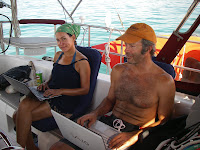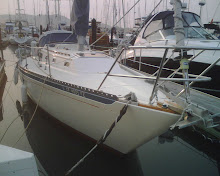
Sailing can sometimes be a very humbling experience-- Mother Nature occasionally hands our as**es to us on a platter. One such instance occurred a few days ago during our passage from Puerto Vallarta to Tenacatita.
We left PV with plans to do an overnighter for the 150-mile trip. Normally, we would've broken it into several stops, but we were late to meet my friend Brita, having hung around PV an extra day to catch up with our friends Matt and Olivia Fix-Chang and their two very inquisitive sons, Ethan (1) and Andrew (3).
Simulated conversation:
Andrew: "What's that?"
Nathan: It's a jib sheet.
Andrew: Why?
 Nathan:
Nathan: You pull it to change the angle of the jib
Andrew: Why?
Nathan: To change the air flow around the sail
Andrew: Why?
Nathan: Because if air flows faster on one side than the other, it creates lift which moves the boat forward
Andrew: Why?
Nathan: It's a physics thing, a property of Nature
Andrew: Why?
Nathan: Well, depending on your belief system, either it "just is," or that's the way God made it
Andrew: Why?
Nathan: So he could watch the sailboats go by on his days off
Andrew: Why?
Anyway, we used our new-to-us autopilot ("Otto") to cross Banderas Bay, then motored around Cabo Corrientes. Cabo Corrientes is Spanish for "Current Cape" and it's where several ocean currents meet, creating very mixed, turbulent, confused seas-- or, as a fellow sailor on the dock in La Cruz had warned us, "washing machine seas." As we rounded the cape, the wind picked up a bit and we raised the sails.
As the waves churned around us and tossed Hurulu every which direction, the wind continued to pick up. Before long, it was blasting at what was probably 25-30 knots. We were running downwind, which is usually the most comfortable point of sail for strong winds since the boat's forward speed serves to 'subtract' from the overall apparent wind.
But, with ten and twelve foot seas running behind us-- and occasionally from the side-- it became increasingly harder to keep the boat under control. We risked "broaching", a very nasty occurrence where the force on the sails overcomes the power of the rudder, causing the boat to lose control and violently round up into the wind. It took all the hackles-raising attentiveness I could muster, and all my strength, to keep her under control while she surfed down the waves (indeed, my arms were very sore the next day).
Then, for the first time on our trip, we got "pooped"-- basically, a wave broke over the stern of the boat and flooded the cockpit. This is a pretty unnerving experience, but fortunately the water drained fairly rapidly out the scuppers, and I gave silent thanks to Bill (see previous post), who had wisely insisted we replace the cockpit drain hoses before we left.
Since the sun was setting, and since the boat was increasingly hard to control-- and since it was her birthday-- I took over Naomi's shift and stayed at the helm for close to 6 hours, adrenaline flowing the entire time. I wanted to reef the sails but instead we decided to pull into the next safe harbor, about 20 miles due south, and wait out this weather.
This was the roughest weather we'd thus far experienced on our trip. To be frank, apart from getting soaked periodically, it was fairly exhilarating, as the boat continued to hit new speed records, first 8.6, then 9.2, then 9.5, after which the knotmeter stopped working (it still hasn't come back yet). I sailed for more than an hour at sustained 8.5 knots. Given that the hull speed is around 7, we were getting at least a couple of knots from surfing the waves.
But, as on the SF Bay, such "big weather" is fun for an hour or so--as long as you can duck out behind an island or something, which we couldn't do. Also, at one point, with massive seas behind us, we were visited by a pod of dolphins, who ran alongside, surfing down the waves. Very cool. Visits from these guys always help to brighten the mood and alleviate anxiety.
At long last, we got some relief from the clashing waves, and pulled toward the small harbor called Ipala. Now a new set of tensions arose, because: i) it was a completely dark, moonless night; ii) it was a small cove, already occupied by a few boats; iii) the charts of this area all all 1-2 miles off, so we couldn't rely on our handheld GPS to guide us in; iv) it contained a submerged rock; v) it was reported to have fishing nets near the opening; and, vi) it was also pretty deep, 40-60 feet, which is at the limits of the length of our chain.
When we dropped the anchor and came to a halt, we saw we were just 6-7 feet away from a set of floating nets (if we had run over them, they would have wrapped around our propeller and caused all sorts of trouble). Naomi promptly went to sleep, and I had one of my last Racer 5 IPA beers I'd been saving for such "stressful" days as these. Only one word to describe our sentiment at that point: "whew!"

The next day we woke early to try and make up some distance. The day started calm, and in the first hour of my shift I saw several whales, a whole bunch of dolphins, and a few sea turtles (one of which literally "waved" at us with his flipper as we passed by). Then, much to our dismay, the wind started blowing, but from the South-- the "wrong way", straight in the direction we were trying to go. To make matter worse, the seas were still choppy, this time due to the contrary wind (vs the clashing currents of the day before). However, it was less intense vs. the previous day, and we made slow headway.
It became clear we weren't going to make it in time to meet Brita, so in a br

ief moment when we got a cell signal, we texted her to get a hotel room. As the day wore on, progress was a grind. After sunset, the seas finally calmed down, and we made the decision to use it as an opportunity to keep plowing ahead (always a tough decision when tired). This turned out to be the right call, and we approached Tenacatita Bay just before sunrise. We actually had to slow it down so as to enter with some light, since it was still moonless. But, as dawn broke, we spotted the familiar Catalina 44
La Palapa, pulled up near them, and promptly passed out, only to be awoken a few hours later with....
(continued next blog)







































